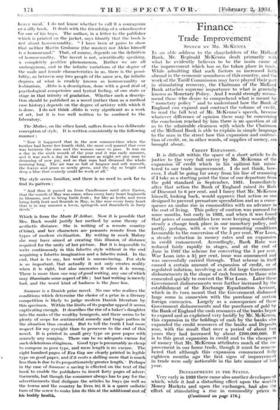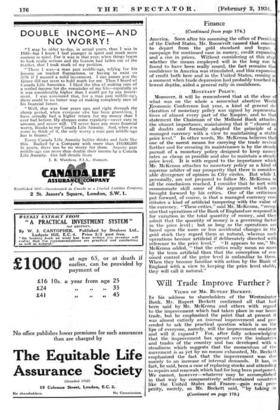mance
Trade Improvement
SPEECH BYMg MCKENNA.
IN an able address to the shareholders of the Midland Bank, Mr. Reginald McKenna dealt primarily with what he evidently believes to be the main cause of the improvement which has, so, far taken place in trade. While admitting that such factors .aS increased faith abroad in the economic soundness of this-country, and the work of the Tariff Commission may have played their part in stimulating recovery, th'e Chairrnan Of the Midland Bank attaches supreme importance to what is generally known as Monetary Policy. And I would strongly recom.: mend those Who desire to comprehend what is meant by "monetary policy" and to understand how the Bank of England can expand and contract the volume of credit, to read the full text of Mr. McKenna's speech, because whatever difference' of opinion there may be concerning the conclusion reached by- him there is no question at all as te the admirable clearness with which the Chairman of the Midland Bank is able to explain in simple language to the man in the street how this expansion and contrael, tion Credit,' or, in other words, of supplies of money, are brought about-. .
CREDIT EXPANSION.
It. is difficult within the space of a short article to do justice to the very full survey by Mr. McKenna of the expansion ir credit -which -in his Opinion hdsminis tered. to our trade improvement. I do not think, how- ever, I shall be going far away from his line of reasoning if I take as a starting point the time of our departure from the gold standard in September, 1931. - Imthediately after that action the Bank of England raised its Rate of Discount to 6 per cent. and I fancy.that gr. McKenna himself, looking back, would approve that action as one designed-to prevent premature speculation and as a conse- quence an undue rise in commodities with an advance in the cost of living. This policy of caution was pursued for some months, but early in 1932, and when it was found that prices of commodities here were keeping wonderfully steady a change took place in our- monetary policy, and partly, perhaps, with a view to promoting conditions favourable to the conversion of the 5 per cent. War Loan, a steady reduction in money rates and an expansion in credit bornmenced. Accordingly, - Bank - Rate was reduced fairly -rapidly in stages,. and at the end of June in 1932 the scheme for converting The 5 per cent. War Loan into a 81 per eent, issue was announced and was successfully carried through. That scheme in itself caused a certain amount of eigiansiOn of Credit, or of regulated inflation, involving as it did large Government: disburs' einents in the shape of cash bonuses ter those who consented quickly to convert the War Loan.- Later these Government disbursements were further hiciensedby the establishment of the Exchange Equalization Account, which in its turn meant that the Government disbursed • large sums in cOnnexicin with the purchase of certain foreign currencies. Largely as a consequence of these Government disbursements and the purchases of gold by the Bank of England the cash resources of the banks began to expand and as explained Very lucidly _by Mr: McKenna:, this expansion in the-- holdings of cash by the-banks alsto expanded the credit resources of the banks and Deposits, rose, 'vrith the result that over a period of abont two years they had increased, by about X200,000,900: It is to this great expansion in credit and to the cheapness Of money that Mr. McKenna attributes much of the im- provement in our home trade, :though it Must be rernein- .bered that although this'- expaOsion --commenced fully eighteen months ago the fir4 signs of improvement in trade were only noticeable In-the late simmer -of last year.
DEVELOPMENTS IN THE STATES.
Very early in 1938 there came also another development -which, while it had a disturbing effect upon the world's Money Markets and upon the exchanges, had also the effect. of Stimulating a rise in commodity" prices in.
(Continued on page 176.)
Finance
(Continued from page 174.) America. Soon after his assuming the office of Presiden of the United States, Mr. Roosevelt caused that countr to depart from the gold standard and begun campaign for continued ease in money, credit expansio and a rise in prices. Without considering at this sta whether the means employed will in the long rim found to have been really solind, the fact remains ti: confidence in America was stimulated, and this expansio of credit both here and in the United States, coining at a moment when trade"depression had probably touched its lowest depths, aided a general rally in confidence.
MONETARY POI1CY.
Moreover, it will be remembered that at the close o what was on the whole a somewhat abortive Worl Economic Conference last year, a kind of general de. .claration of monetary policy was signed by representa- tives of almost every part of the Empire; and to that statement the Chairman of the Midland Bank attaches the utmost importance, maintaining that it "cleared up all doubts and formally adopted ° the principle of a managed currency with a view to maintaining a stable price level." In other words, Mr. McKenna believes that one of the surest means for carrying the trade revival further and for securing its maintenance is by the steady pursuit of a monetary policy designed to keep money rates as cheap as possible and also to maintain a steady price level. It is with regard to the importance which Mr. McKenna attaches to monetary policy as a kind of supreme arbiter of our prosperity that there is consider- able divergence of opinion in City circles. But while I, personally, am not prepared to follow Mr. McKenna in all the conclusions reached, I consider that he met with consummate skill some of the arguments which are brought forward by his critics. One of the criticisms put forward, of course, is that a managed currency con- stitutes a kind of artificial tampering with the value of the currency. "These critics," said Mr. McKenna, "recog- nize that operations of the Bank of England are responsiLle for variation in the total quantity of money, and they admit that the quantity of money is a governing factor in the price level ; but so long as the operations are based upon the more or less accidental changes in the gold stock they regard them as natural, whereas such operations become artificial if deliberately directed with reference to the price level." "It appears to me," Mr. McKenna added, that the critics really mean no more by the term artificial than that the conception of rea- soned control of the price level is unfamiliar to them. When they become familiar with action by the Bank of England with a view to keeping the price level stable, they will call it natural."









































 Previous page
Previous page